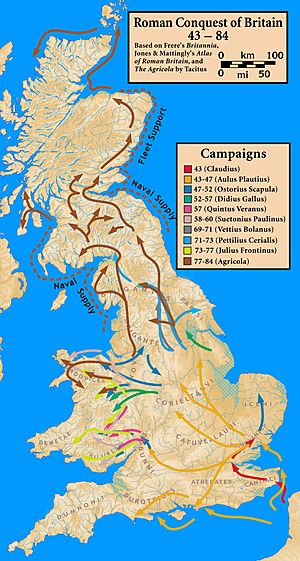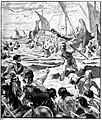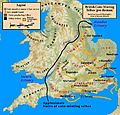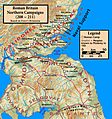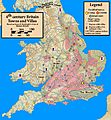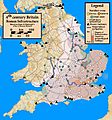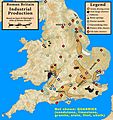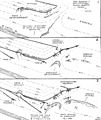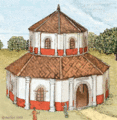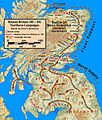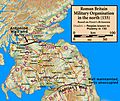Roman Britain facts for kids
Quick facts for kids Provincia Britannia |
|||||||||
|---|---|---|---|---|---|---|---|---|---|
| provinces of the Roman Empire | |||||||||
| 43–410 | |||||||||
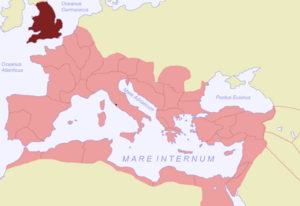 Britain within the Roman Empire |
|||||||||
| Capital | Camulodunum Londinium |
||||||||
| Historical era | Classical antiquity | ||||||||
|
• Annexed by Claudius
|
43 | ||||||||
|
• Withdrawal
|
410 | ||||||||
|
|||||||||
| Today part of | |||||||||
Roman Britain (also called Britannia) was the part of Great Britain that belonged to the Roman Empire. This was from about AD 43 until 410.
The first Roman leader to visit Britain was Julius Caesar. He came during the time of the Roman Republic. In 54 BC, he beat the powerful Catuvellauni tribe. Their main town near Wheathampstead was taken over. But Caesar had problems in Gaul (modern France and Belgium). This meant he could not stay in Britain. The full Roman takeover of Britain was put off for almost 100 years.
In AD 43, Emperor Claudius sent a large army to Britain. It was led by Aulus Plautius, an important senator. He had four legions, which was about 20,000 soldiers. He also had many helpers, about the same number.
The legions were:
- Legio II Augusta
- Legio IX Hispana
- Legio XIV Gemina
- Legio XX Valeria Victrix
The II Augusta was led by Vespasian, who later became emperor. The other three legions also had important leaders.
The Roman invasion changed British history a lot. After a big rebellion led by Boudica, there was mostly peace. Roman soldiers left Britain in AD 410. They had been there for almost 400 years. After they left, local leaders took over running the country. This time was called Sub-Roman Britain. People had a mix of Roman and British culture. They might have spoken a language based on Latin. This period lasted about 200 years. Then, Anglo-Saxon England slowly took over by the early 600s.
Contents
Roman Technology in Britain
Roman technology greatly changed Britain. They built many roads, villas (large country houses), forts, and cities. The Romans built a huge network of roads across Britain. People used these roads for many centuries. Many of them are still used today.
The Romans also built systems for water supply, sanitation (keeping things clean), and sewage (waste water removal). Many of Britain's big cities started with the Romans. These include London (called Londinium), Manchester (Mamucium), and York (Eboracum).
Before the Romans, people in Britain did not use writing. The Romans brought writing with them. After they left, writing mostly survived because of religion.
The British people were good at art. They made fancy jewellery and pottery. They even sold these items to other parts of Europe. They also built strong defenses like hill forts. They were skilled fighters using spears, bows, and arrows. Small round stones found at old sites show they used slings or catapults.
To keep control, the Romans built forts and army camps all over Britain. They also made the existing roads better. Local people had to help keep the Roman roads in Britain in good shape. In return, they paid less tax. Roman roads helped armies move around. They also helped deliver supplies. The forts and camps needed food and other things. Large areas of land grew these goods. For example, the Somerset levels, which often flooded, were like a huge farm. They supplied food to forts in Exeter, Gloucester, Bath, and other places. Local fishermen caught fresh fish. Farmers raised sheep, pigs, cows, and chickens for the soldiers.
Christianity in Roman Britain
Missionaries from Gaul (modern France) started bringing Christianity to western Britain. By the end of the first century AD, there was a Church of Celtic Christianity there. This religion spread. By the mid-second century, much of Cornwall, Devon, western Dorset, and southern Somerset had become Christian.
Christianity kept spreading eastward and strongly northward into Wales. This happened over the next 200 years. It grew even more after Rome itself became Christian. The Romans had built shrines and temples to their pagan gods. They kept using these, even after Christianity became popular in Rome.
Related pages
Images for kids
-
Hadrian's Wall viewed looking east from Vercovicium (Housesteads)
-
Prima Europe tabula. A 1486 copy of Ptolemy's 2nd-century map of Roman Britain
-
One possible arrangement of the late Roman provinces, with Valentia between the walls
-
Another possible arrangement, with other possible placements of Valentia noted
-
Development of Dolaucothi Gold Mines
-
Roman public baths (thermae) in Bath (Aquae Sulis).
-
Artist's reconstruction of Pagans Hill Roman Temple, Somerset
-
Fourth-century Chi-Rho fresco from Lullingstone Roman Villa, Kent, which contains the only known Christian paintings from the Roman era in Britain.
See also
 In Spanish: Britania (provincia romana) para niños
In Spanish: Britania (provincia romana) para niños
 | Sharif Bey |
 | Hale Woodruff |
 | Richmond Barthé |
 | Purvis Young |


